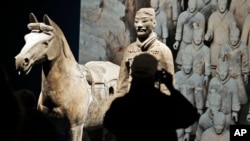China faces international criticism over its early reaction to COVID-19 and "re-education" camps for ethnic Uighurs. There also has been criticism of the Chinese government’s online restrictions and other activities.
Yet China’s leader, Xi Jinping, would much rather talk about something else: archeology. Recently, he used a high-level meeting to talk about ways archeology could serve the interests of the ruling party.
Speaking to the Politburo of the Chinese Communist Party, Xi discussed the “socio-political and cultural” importance of archeology. He called for developing China’s field of archeology to better understand the history of Chinese civilization, its beginnings, and the ways it has helped humanity.
Archeology is not usually an important issue for national leaders. Some experts argue that Xi is looking for ways to strengthen the power of the ruling party among China's own people.
Experts overseas note that Chinese archeology has for years been caught up in different social and political battles. Nationalism has long influenced the kind of research being done and how discoveries are interpreted.
Xia Ming is an expert on Chinese politics at New York University. He says that Xi's goal is to use archeology as a tool to create a better international image of China.
"I think what Xi wants to say is that today, if we can't have the world, we can still make the world's greatest civilization," Xia said. "The center and the driving force of world civilization is not in the West at all. Not in the United States, but in China.”
He added that the push will try to show how all sciences and research fields serve the communist party.
Xi is not the first Chinese president who has used archeological discoveries to serve foreign policy.
In October 2003, then-Chinese President Hu Jintao spoke to the Australian Parliament on a state visit to Australia. He said that the friendly exchanges between the two countries have a long history, although they are far apart.
"As early as the 1420s, China's Ming Dynasty's ocean-going fleet had been to Australia's shores,” he said.
Xia said Hu Jintao used China's archeological findings to justify China's continuing interest in the area. He added that at the time, many Australians were critical of Hu’s comments.
China expert Gordon Chang said that for the Communist Party, archeology has never been about science but a tool to assist the party. For example, China has used "archeological evidence" to prove that the South China Sea is part of China.
“It has everything to do with China's territorial ambitions," Chang said.
Another China expert, Wang Juntao, sees a different reason for the new archeological push. He thinks Xi Jinping might be trying to justify his actions as the country’s leader, not the party. For this, he must find reasons and support from Chinese tradition. For most of its history, China was ruled by a single leader, who had great power.
I’m Susan Shand.
VOA’s Yang Ming reported this story. Susan Shand adapted it for Learning English. George Grow was the editor.
__________________________________________________________
Words in This Story
interpret – v. an understanding of language or actions to have a specific meaning
dynasty – n. a period of time, usually defined by the life of a ruler
fleet – n. a group of ships
ambition – n. goals or objectives





